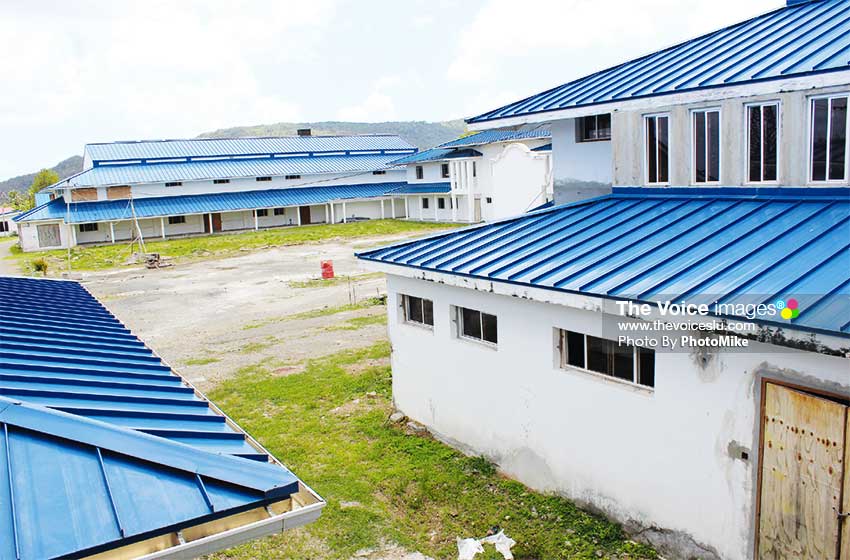WHATEVER government decides to do with St. Jude hospital will be done on the hospital’s old site at Cantonment — a site that already houses the unfinished structure said to have cost between $98 million and $118 million, depending on which report is being quoted and/or believed.

But whatever the true cost, Economic Development Minister Guy Joseph made the announcement (about the new hospital on the old site) yesterday at a pre-Cabinet press briefing, in an effort to cool a heated public debate on widespread talk — still unconfirmed — that government intends to build another new hospital on another site to replace the unfinished structure at Cantonment.
The idea (of building a new hospital to replace the unfinished St. Jude) has been mentioned by several high-ranking members of the government, including Health Minister Senator Mary Isaac and Prime Minister Allen Chastanet, after a technical audit of the unfinished facility revealed several flaws with it.
These revelations ignited a heated public and political debate as to the suitability of the incomplete structure for a hospital of international standards, which were the intentions of the government when construction first begun in 2010.
The debate has been taking on a new life, with medical experts, engineers and architects weighing-in, all proclaiming that the flaws outlined with the structure at Cantonment could be rectified and that the structure could very well be completed to boast a state-of-the-art hospital, contrary to the government’s arguments that the structure was unworthy.
Prime Minister Chastanet earlier promised to review the matter and within 30 days announce a way forward. The allotted time frame is almost up, but Prime Minister Chastanet is presently out of the country — and will be out for more than a week, according to information received.
Joseph, nevertheless, told reporters that soon after Chastanet’s return to the country a public statement on the way forward will be made.
He further admitted that government did several assessments regarding the St. Jude reconstruction project and other projects within the country’s healthcare system — and that Cabinet yesterday discussed a document relating to St. Jude, which will make government’s decision easier on the steps it should take to give the people in the south a hospital.
He reiterated, however, that whatever government decides will be done to St. Jude will be done on the same old site — and not on another new one.
“The problems that will be addressed, (with regards to St. Jude) will be addressed using the existing St. Jude site,” Joseph said, adding that based on information available and gathered from the various assessments done to date on the hospital, a few of the newly-constructed buildings will be incorporated into the new designs for the hospital.
He said that those buildings on the site that will not be used in the new design moving forward will be used for other purposes and that drawings showed what parts of the hospital could be used.
“As a government, we are in a much better position to make a decision moving forward,” he said noting that this was possible due to the number of assessments, discussions and back and forth government has had.
But Joseph insisted that the decision to remain with the old site and use of buildings on the site in the new plans for the hospital does not, in any way, change government’s intentions to proceed with investigations into what transpired with the hospital’s reconstruction and the monies spent on it.
“Those to be held accountable will be held accountable,” he said, noting that a quick look at a preliminary report emerging from the financial audit done on the incomplete hospital reconstruction project showed that there is a lot to be concerned about.
“More information will be disclosed when the prime minister gives a full address,” Joseph said.
Regarding the talks about privatization of the Owen King European Union Hospital, Joseph said government’s position is not to privatize the hospital, but rather to enter into a joint venture arrangement.
“In terms of the operation side, this is where we are exploring and as we have said no agreement has been signed, or entered into. There is more than one company which has indicated interest in the joint venture with the government,” Joseph said.
In respect of talks that government intends to establish a national health insurance scheme for citizens Joseph said that this will happen either by April 1st of next year or the beginning of the 2019 financial year.
“We have been engaged in discussions with a number of insurance companies. Some have sent in quotations to the government in relation to the cost of coverage for the entire 170,000 population.” Joseph said.
He said that everyone will be clear about the type of coverage they will be getting and who government will be responsible for regarding the monthly premiums and that government has no intentions to interfere with the insurances currently held by those who could afford them.
The expectation of the government is that each St. Lucian would, on average, have at least $100,000 coverage per year.
According to Joseph, government will pay for the poor, unemployed, indigent, elderly — and those below an unspecified income bracket.







![Attendees at the UHC logo and website launch [Photo credit: GOSL]](https://thevoiceslu.com/wp-content/uploads/2026/02/Attendees-at-the-UHC-logo-and-website-launch-380x250.jpg)






![Remnants of an alleged drug boat blown up in a lethal strike by the U.S. military last week surfaced off Canouan on Saturday [Photo credit : St Vincent Times]](https://thevoiceslu.com/wp-content/uploads/2026/02/Remnants-of-an-alleged-drug-boat-blown-up-380x250.jpg)
